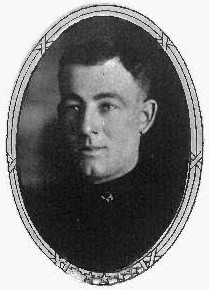Slater, Roxy W.

Born:
Salt Lake City, Utah, April 21, 1892
Date of Death:
January 19, 1919
Hero Bio:
Roxy Wilson Slater was born in Salt Lake City, Utah, April 21st, 1892. He received a public school education, after which he took to farming. For several years he was with the Kern Land Company at Bakersfield, California, and with the U. C. Company at Montello, Elko County, Nevada. He was in the latter company’s employ when the first call went out for men, and the call found him ready to take up arms for his country’s cause. On the 6th of October, 1917, he fell into line with the Elko County’s offering of young men, and entrained for the army camp at American Lake, Washington. He received his preliminary training in the 67th Company, 17th Battalion, 166th Depot Brigade, until the 2d of January, 1918, transferring then to Company F, 316th Ammunition Train of the 91st Division. In this unit he left for France on July 12th, 1918. A month later he was made corporal (August 10th), and two months after that a sergeant (October 21st). He had gained the confidence of officers and men which brought him a popularity far beyond the ordinary. In January, 1919, while at Gievres, France, he took a heavy cold and was compelled to rest around the barracks for about ten days. Then a fever developed and passed away, but the next day (Friday) he felt better and said he would soon be up once more. That night they took him to Base Hospital 43 with a temperature of 103, and although everything that could be done, was done, he lapsed into unconscious early Sunday morning and died at 11:30 that night (January 19, 1919).
Eugene B. Smith, the Chaplain of the regiment, tells of Sergeant Slater’s burial in these words: “In the many funerals which I have had during the past five months, I have had none where the man had so won the admiration and respect of his comrades as had Roxy. His Company officers at once arranged for the finest funeral possible. They secured a military band, and had a double escort, and secured from a nearby city several beautiful pieces. The wreath must have measured thirty inches in diameter. Three companies of troops and the entire staff of battalion officers attended. The day was perfect. At the cemetery, which is an American cemetery with the Stars and Stripes floating above it the service was impressive—so much that the officers spoke about it afterwards.
We made it as beautiful as possible. The spot lies just outside the camp, between two groves of French pines, quiet and peaceful. Following the service three volleys were fired, the honor always paid to a soldier, and ‘taps’ was blown,—the bugle call that calls the soldier to rest and sleep at the end of the day’s work.” The grave is No. 1541, American Cemetery, Gievres, Loire et Cher, France.
First Lieutenant George B. Somers, commanding Roxy’s company, has written: “I cannot tell you how badly we all felt, for during the past sixteen months he had become one of the family, and we feel lost without him. He was our best duty sergeant; conscientious, reliable, and a good soldier. He had the respect of every man in the outfit. No confidence imposed in him was ever misplaced * * * He lies in the center of the American Cemetery at Gievres, almost directly under the Flag he loved so well.”
“His officers say he was a clean man.” wrote Chaplain Smith, “and that he was absolutely square, that he was liked by every man that knew him, and that there was nothing wrong about him.”
The soldier is survived by his mother, Mrs. Lilly Conkling, and his sister, Mrs. Ethel Robbins, 404 Harrison Street, Oakland, California.
Rank in Death:
Sergeant
Regiment, Brigade, Division in Death
Company F 318th Ammunition Train 91st Division